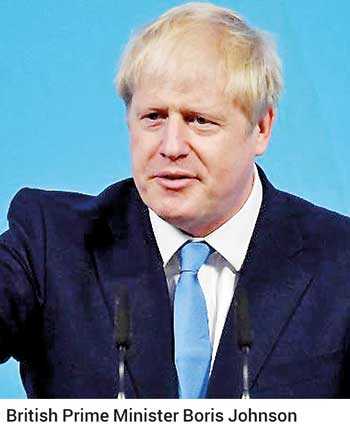Monday Feb 16, 2026
Monday Feb 16, 2026
Thursday, 29 August 2019 00:18 - - {{hitsCtrl.values.hits}}
LONDON (Reuters): British Prime Minister Boris Johnson will limit parliament’s opportunity to derail his Brexit plans by cutting the amount of time it sits between now and EU exit day on 31 October, infuriating opponents who accused him of a constitutional outrage.
In his boldest move yet to take the country out of the European Union with or without a divorce deal, Johnson said he would set 14 October for the Queen’s Speech – the formal state opening of a new session of parliament where he will set out his government’s legislative agenda. 
That would effectively shut parliament from mid-September for around a month and reduce the parliamentary time in which lawmakers could try to block a no-deal Brexit.
The news sent the pound down sharply against the euro and dollar.
Asked in a broadcast interview if he was trying to block politicians from delaying Britain’s departure from the EU, Johnson replied: “That is completely untrue.
“There will be ample time on both sides of that crucial 17 October (European Union leaders’) summit, ample time in parliament for MPs (Members of Parliament) to debate the EU, to debate Brexit and all the other issues, ample time.”
More than three years after the United Kingdom voted 52% to 48% to quit the European Union, it is still unclear on what terms – or indeed whether – the bloc’s second largest economy will leave the club it joined in 1973.
With just 65 days until exit day, parliamentarians are battling to prevent the prime minister from steering the country out of the EU without a transitional deal, pitching one of Europe’s most stable countries into a constitutional crisis.
On Tuesday, the leaders of Britain’s opposition parties joined forces to seek to use parliamentary procedure to force Johnson to delay Brexit beyond 31 October. On Wednesday, Johnson finally showed his hand.
While suspending parliament ahead of a Queen’s Speech is the historical norm in Britain, the decision to limit parliamentary scrutiny weeks before the country’s most contentious policy decision in decades prompted an immediate outcry.
Parliament speaker John Bercow said the move was a “constitutional outrage” designed to stop lawmakers debating Brexit.
“This action is an utterly scandalous affront to our democracy,” Tom Watson, deputy leader of the opposition Labour Party, said on Twitter. “We cannot let this happen.”
Philip Hammond, a member of Johnson’s Conservative Party and former finance minister who has pledged to block a disorderly Brexit, said it would be a constitutional outrage if parliament cannot hold the government to account.
Nicola Sturgeon, the first minister of Scotland, urged pro-EU lawmakers to act, describing Wednesday as a “dark one indeed for UK democracy” if they did not.
Sterling fell sharply, losing around a cent against the US dollar and the euro, as investors took the news as a sign that a no-deal Brexit, and the prospect of a hit to Britain’s economy, was more likely. Johnson argued, however, that the move was designed to allow his government to press on with its domestic agenda. “If you look at what we’re doing, we’re bringing forward a new legislative programme.”
Finance minister Sajid Javid announced on Tuesday that he would set out his spending plans for the government on 4 September. Parliament returns from its summer break on Sept. 3 and had been expected to sit for two weeks before breaking up again to allow political parties to hold their annual conferences. Typically it begins sitting again in early October.
The Queen’s Speech is the formal state opening of a new session of parliament at which Queen Elizabeth reads a speech prepared by the government, setting out a legislative agenda for the coming year.
A Queen’s Speech on 14 October would delay parliament’s return, and leave lawmakers with just over two weeks until Britain is due to leave the EU on 31 October.